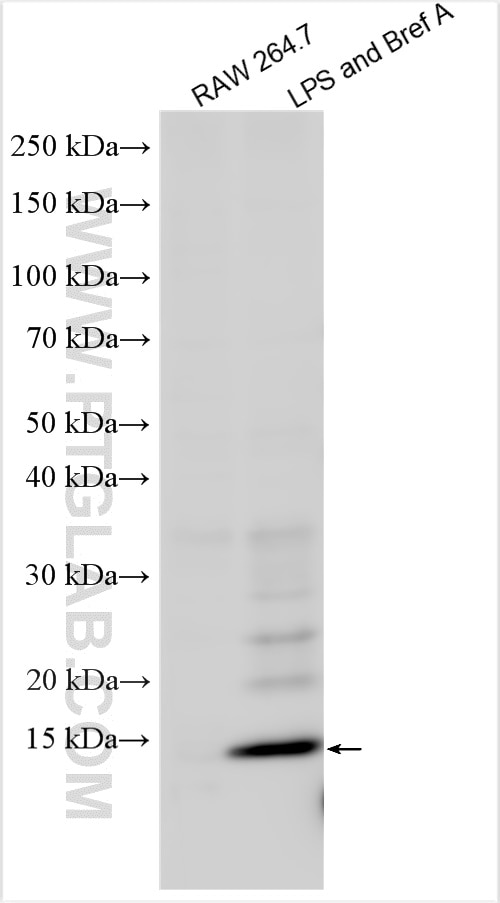TNF-alpha Polyclonal antibody
TNF-alpha Polyclonal Antibody for WB, ELISA
Host / Isotype
Rabbit / IgG
Reactivity
mouse and More (1)
Applications
WB, IHC, ELISA
Conjugate
Unconjugated
Cat no : 26162-1-AP
Synonyms
Validation Data Gallery
Tested Applications
| Positive WB detected in | RAW 264.7 cells |
Recommended dilution
| Application | Dilution |
|---|---|
| Western Blot (WB) | WB : 1:500-1:1000 |
| It is recommended that this reagent should be titrated in each testing system to obtain optimal results. | |
| Sample-dependent, Check data in validation data gallery. | |
Published Applications
| WB | See 4 publications below |
| IHC | See 2 publications below |
Product Information
26162-1-AP targets TNF-alpha in WB, IHC, ELISA applications and shows reactivity with mouse samples.
| Tested Reactivity | mouse |
| Cited Reactivity | mouse, rat |
| Host / Isotype | Rabbit / IgG |
| Class | Polyclonal |
| Type | Antibody |
| Immunogen | TNF-alpha fusion protein Ag24089 相同性解析による交差性が予測される生物種 |
| Full Name | tumor necrosis factor |
| Observed molecular weight | 17 kDa |
| GenBank accession number | NM-013693 |
| Gene symbol | TNF-alpha |
| Gene ID (NCBI) | 21926 |
| RRID | AB_3085845 |
| Conjugate | Unconjugated |
| Form | Liquid |
| Purification Method | Antigen affinity purification |
| Storage Buffer | PBS with 0.02% sodium azide and 50% glycerol pH 7.3. |
| Storage Conditions | Store at -20°C. Stable for one year after shipment. Aliquoting is unnecessary for -20oC storage. |
Background Information
TNF, as also known as TNF-alpha, or cachectin, is a multifunctional proinflammatory cytokine that belongs to the tumor necrosis factor (TNF) superfamily. It is expressed as a 26 kDa membrane bound protein and is then cleaved by TNF-alpha converting enzyme (TACE) to release the soluble 17 kDa monomer, which forms homotrimers in circulation. It is produced chiefly by activated macrophages, although it can be produced by many other cell types such as CD4+ lymphocytes, NK cells, neutrophils, mast cells, eosinophils, and neurons. It can bind to, and thus functions through its receptors TNFRSF1A/TNFR1 and TNFRSF1B/TNFBR. This cytokine is involved in the regulation of a wide spectrum of biological processes including cell proliferation, differentiation, apoptosis, lipid metabolism, and coagulation. Mouse and human TNF-alpha share 79% amino acid sequence identity. Unlike human TNF-alpha, the mouse form is glycosylated. In mouse deficiency of this gene is associated with defects in response to bacterial infection, with defects in forming organized follicular dendritic cell networks and germinal centers, and with a lack of primary B cell follicles.
Protocols
| Product Specific Protocols | |
|---|---|
| WB protocol for TNF-alpha antibody 26162-1-AP | Download protocol |
| Standard Protocols | |
|---|---|
| Click here to view our Standard Protocols |
Publications
| Species | Application | Title |
|---|---|---|
Biochem Biophys Res Commun Uric acid-lowering effect of harpagoside and its protective effect against hyperuricemia-induced renal injury in mice | ||
J Control Release Microenvironment-responsive nano-bioconjugated vesicles for the multi-pronged treatment of liver fibrosis | ||
ACS Appl Mater Interfaces Evaluation of the Antibacterial, Anti-Inflammatory, And Bone-Promoting Capacity of UiO-66 Loaded with Thymol or Carvacrol | ||
Cell Mol Biol Lett Single-cell view and a novel protective macrophage subset in perivascular adipose tissue in T2DM | ||
Biomed Pharmacother Antinociceptive and neuroprotective effect of echinacoside on peripheral neuropathic pain in mice through inhibiting P2X7R/FKN/CX3CR1 pathway |


